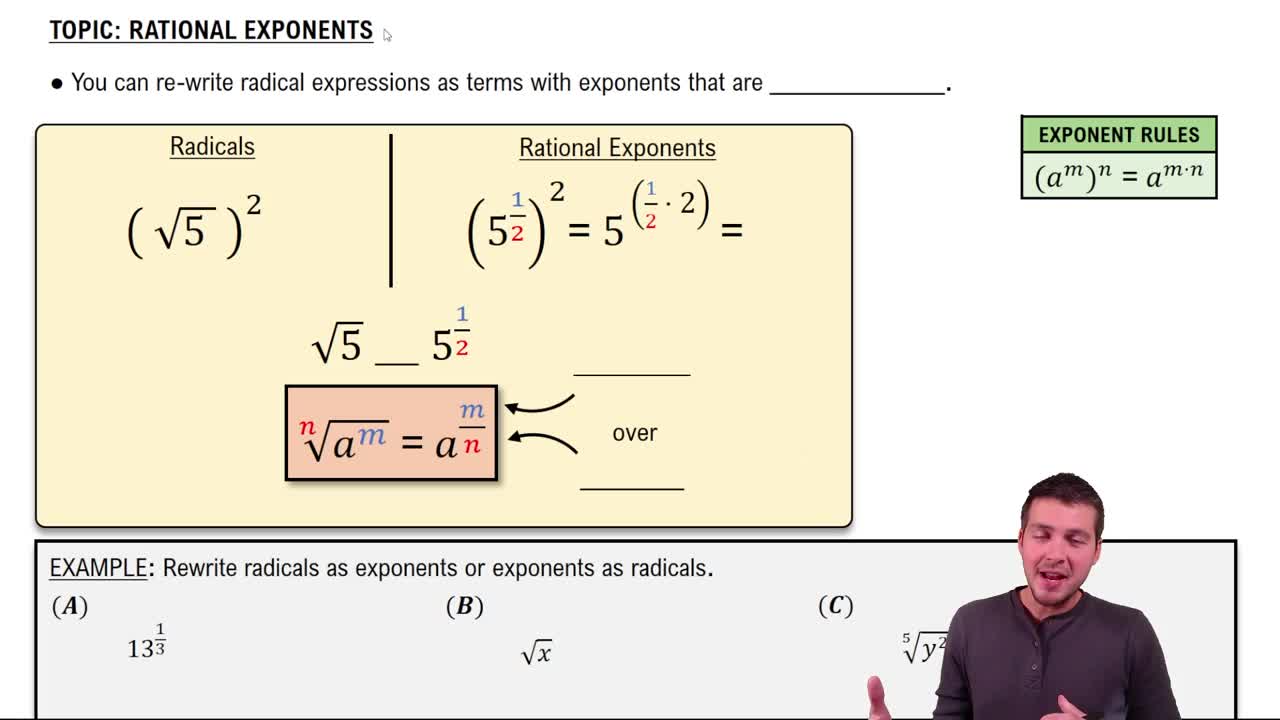Simplify each expression. (93)(95)
Table of contents
- 0. Review of Algebra4h 18m
- 1. Equations & Inequalities3h 18m
- 2. Graphs of Equations1h 43m
- 3. Functions2h 17m
- 4. Polynomial Functions1h 44m
- 5. Rational Functions1h 23m
- 6. Exponential & Logarithmic Functions2h 28m
- 7. Systems of Equations & Matrices4h 5m
- 8. Conic Sections2h 23m
- 9. Sequences, Series, & Induction1h 22m
- 10. Combinatorics & Probability1h 45m
0. Review of Algebra
Exponents
Problem 51
Textbook Question
Simplify each expression. Write answers without negative exponents. Assume all variables represent nonzero real numbers. x12/x8
 Verified step by step guidance
Verified step by step guidance1
Identify the expression given: \(\frac{x^{12}}{x^{8}}\).
Recall the quotient rule for exponents, which states that when dividing like bases, you subtract the exponents: \(\frac{a^{m}}{a^{n}} = a^{m-n}\).
Apply the quotient rule to the expression: \(\frac{x^{12}}{x^{8}} = x^{12-8}\).
Simplify the exponent by performing the subtraction: \(x^{4}\).
Since the exponent is positive, the expression is already written without negative exponents, so the simplified form is \(x^{4}\).
 Verified video answer for a similar problem:
Verified video answer for a similar problem:This video solution was recommended by our tutors as helpful for the problem above
Video duration:
1mPlay a video:
Key Concepts
Here are the essential concepts you must grasp in order to answer the question correctly.
Laws of Exponents
The laws of exponents govern how to simplify expressions involving powers. For division, subtract the exponent of the denominator from the exponent of the numerator when the bases are the same, e.g., x^a / x^b = x^(a-b). This rule is essential for simplifying expressions like x^12 / x^8.
Recommended video:
Guided course

Rational Exponents
Negative Exponents
Negative exponents indicate the reciprocal of the base raised to the positive exponent, such as x^(-n) = 1/x^n. Since the problem requires answers without negative exponents, any negative exponent must be rewritten as a positive exponent in the denominator.
Recommended video:
Guided course

Zero and Negative Rules
Assumption of Nonzero Variables
Assuming variables represent nonzero real numbers ensures that division by zero does not occur, which is undefined. This assumption allows the use of exponent rules safely, especially when simplifying expressions involving division of powers.
Recommended video:
Guided course

Equations with Two Variables

 7:39m
7:39mWatch next
Master Introduction to Exponent Rules with a bite sized video explanation from Patrick
Start learningRelated Videos
Related Practice
Textbook Question
525
views
